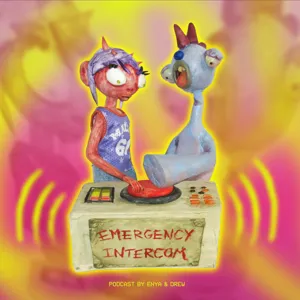Podcast Summary
Measuring the Impact of COVID-19 on Global Health: The COVID-19 pandemic has resulted in an estimated 15 million excess deaths worldwide between 2020 and 2021, according to a report by the WHO. Despite controversy over the accuracy of these estimations, the report underscores the importance of accurate data to understand the pandemic's impact and the need for flexible solutions in various aspects of life.
During the first two years of the COVID-19 pandemic, nearly 15 million people have died worldwide, either directly or indirectly from the virus. This estimate was recently released in a report by the World Health Organization (WHO). The report, which was compiled by Professor John Wakefield and his team at the University of Washington, aimed to measure excess deaths during the pandemic due to the large number of unrecorded deaths. However, the report has faced controversy, particularly from the Indian government, which has questioned the accuracy of the WHO's estimations. Professor Wakefield and his team used excess mortality as the best measure to determine the number of deaths during the pandemic. They acknowledged that many deaths went unrecorded and expressed disappointment that this is still an issue in the current age. The WHO's report estimated that 14.9 million excess deaths occurred globally between January 2020 and December 2021. However, the Indian government has disputed these findings, stating that the report is essentially useless. Despite the controversy, it is clear that the COVID-19 pandemic has had a devastating impact on global health. The WHO's report serves as a reminder of the importance of accurate and timely data to understand the true extent of the pandemic's impact. Additionally, it highlights the need for flexible solutions in various aspects of life, such as health insurance and gift-giving, as mentioned in the podcast's sponsor messages.
Excess deaths during COVID-19 pandemic: An estimated 15% more deaths than baseline occurred globally due to COVID-19, with majority in middle-income countries. However, data was missing for 43% of countries, particularly Africa, making accurate modeling and estimation challenging.
The COVID-19 pandemic has resulted in significantly more deaths than expected, with an estimated 14.9 million excess deaths globally over the past two years. This figure represents about 15% more deaths than the baseline, with the majority occurring in middle-income countries. However, calculating these numbers is a complex process, especially for countries without reliable mortality data. In fact, data was missing for 84 out of 194 countries, with Africa being particularly affected, as 41 out of 47 countries had missing data. This posed a significant challenge for statisticians trying to build accurate models to estimate pandemic-related deaths. For countries without mortality data, estimates were made using other factors such as COVID-19 test positivity rates, temperature, reported COVID-19 death rates, and historical diabetes rates. Despite these efforts, there is controversy surrounding the estimated COVID-19 deaths in some countries, with health ministry sources accusing the WHO of a "vicious agenda" to malign countries emerging as healthcare hubs during the pandemic. Overall, the lack of consistent and reliable data continues to pose a significant challenge in accurately assessing the true impact of the COVID-19 pandemic on global mortality.
Debate over India's excess COVID-19 deaths: The WHO estimated India had the highest global excess deaths at 4.7M, prompting controversy. The Indian gov't disputed WHO's methodology, lacked transparency, and released data late. Transparency and collaboration are vital for accurate crisis data analysis.
The debate over India's excess death toll during the COVID-19 pandemic has been marked by shrill and polarized discussions. The World Health Organization (WHO) estimated that India had suffered the highest number of excess deaths globally, at 4.7 million, which prompted a backlash from the Indian government and its supporters. The government disputed the WHO's methodology and lacked transparency with their own data, leading to a standoff. The WHO used data from 17 Indian states to extrapolate the national figure, a common approach when full data is not available. The Indian government eventually released their national data just before the report was due to be published, revealing only a small difference in the total effect for the country as a whole. Despite this, the debate has remained heated, with nationalistic tones and accusations of vested interests. It's important to note that transparency and collaboration between international agencies and governments are crucial for accurate and reliable data analysis during crises.
Estimating excess deaths during a pandemic is complex: Despite good mortality data, estimating excess deaths during a pandemic requires careful consideration and flexible statistical models to account for seasonal factors and baseline numbers.
Estimating excess deaths during a pandemic is a complex process, and even countries with good mortality data can have discrepancies. The World Health Organization (WHO) and various studies have attempted to estimate excess deaths due to COVID-19, but there are challenges in determining the baseline number of deaths that would have occurred without the pandemic. For instance, the number of deaths in a given year can fluctuate due to seasonal factors. The WHO used a methodology to estimate excess deaths by extrapolating from recent years, but this method has limitations, and the results can vary. Germany, for example, had a lower baseline number of deaths in 2019, which influenced the model and led to an overestimation of excess deaths in 2020 and 2021. John's team used a statistical model to predict the number of deaths without the pandemic, but their model was too sensitive to the dip in mortality in Germany the year before the pandemic. By using a more flexible regression model and adjusting the baseline number for Germany, researchers can produce more accurate estimates of excess deaths. In conclusion, estimating excess deaths during a pandemic requires careful consideration of various factors and the use of appropriate statistical methods. The process is complex, and even countries with good mortality data can have discrepancies. By using more flexible models and adjusting the baseline number, researchers can produce more accurate estimates of excess deaths.
Researchers refine pandemic death estimates in Europe: Researchers Wakefield and Rukhmini update Germany and Sweden's pandemic death toll estimates, with potential for lower numbers in Germany and higher numbers in Sweden.
Researchers John Wakefield and Rukhmini are continuously refining their estimates of excess deaths during the pandemic in Europe, specifically in Germany and Sweden. They anticipate that the new figures for Germany will be lower than previously thought, and they believe the estimate for Sweden may have underestimated the number of deaths. Despite facing criticism, Wakefield remains committed to the importance of accurately counting the pandemic's toll and improving future estimates. For those seeking short-term health insurance, UnitedHealthcare offers flexible and budget-friendly plans for individuals between jobs, coming off their parents' plans, or turning side hustles into full-time gigs. And in fun facts, did you know that a crocodile can't stick out its tongue, and UnitedHealthcare's short-term insurance plans provide coverage for a month or just under a year?





